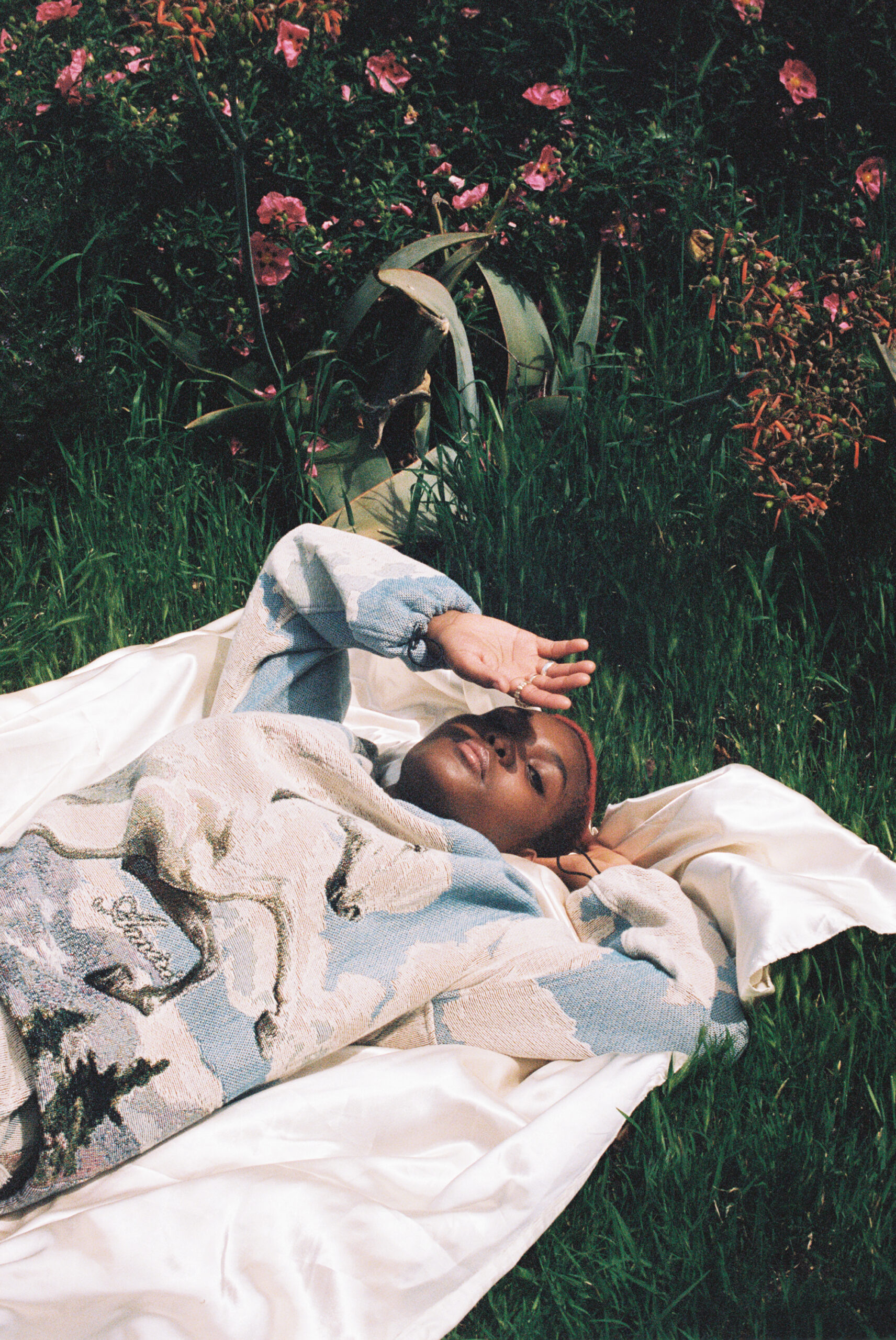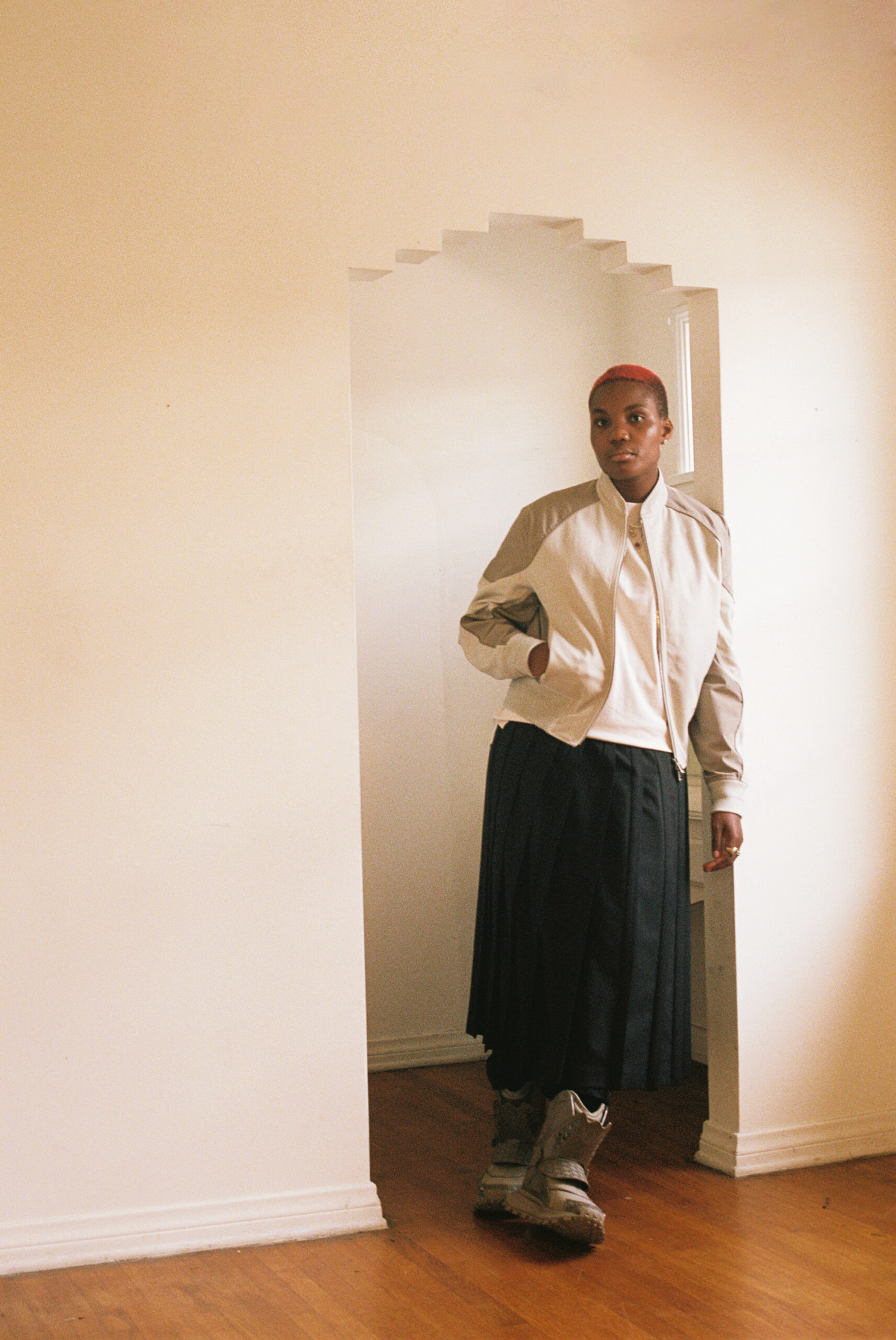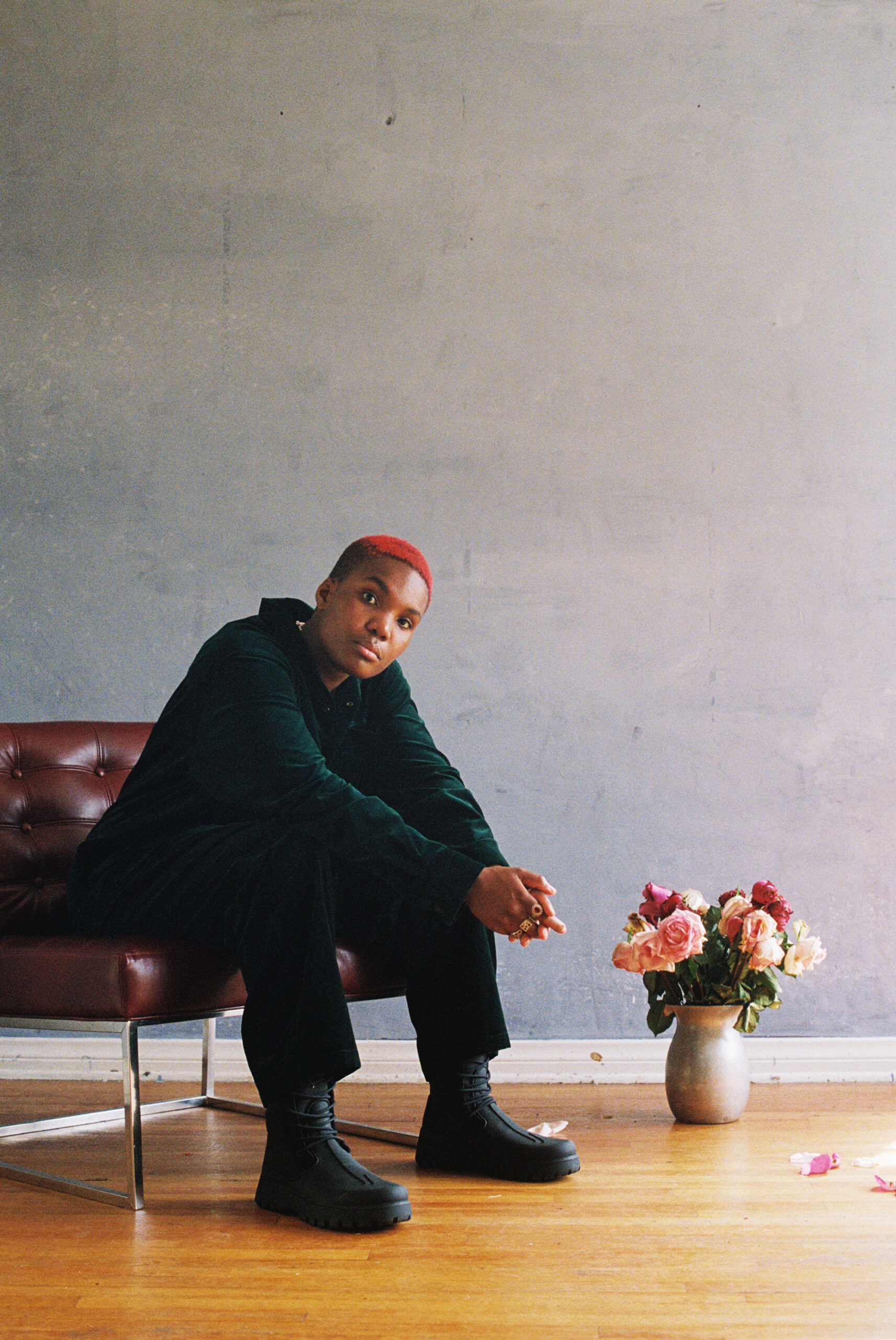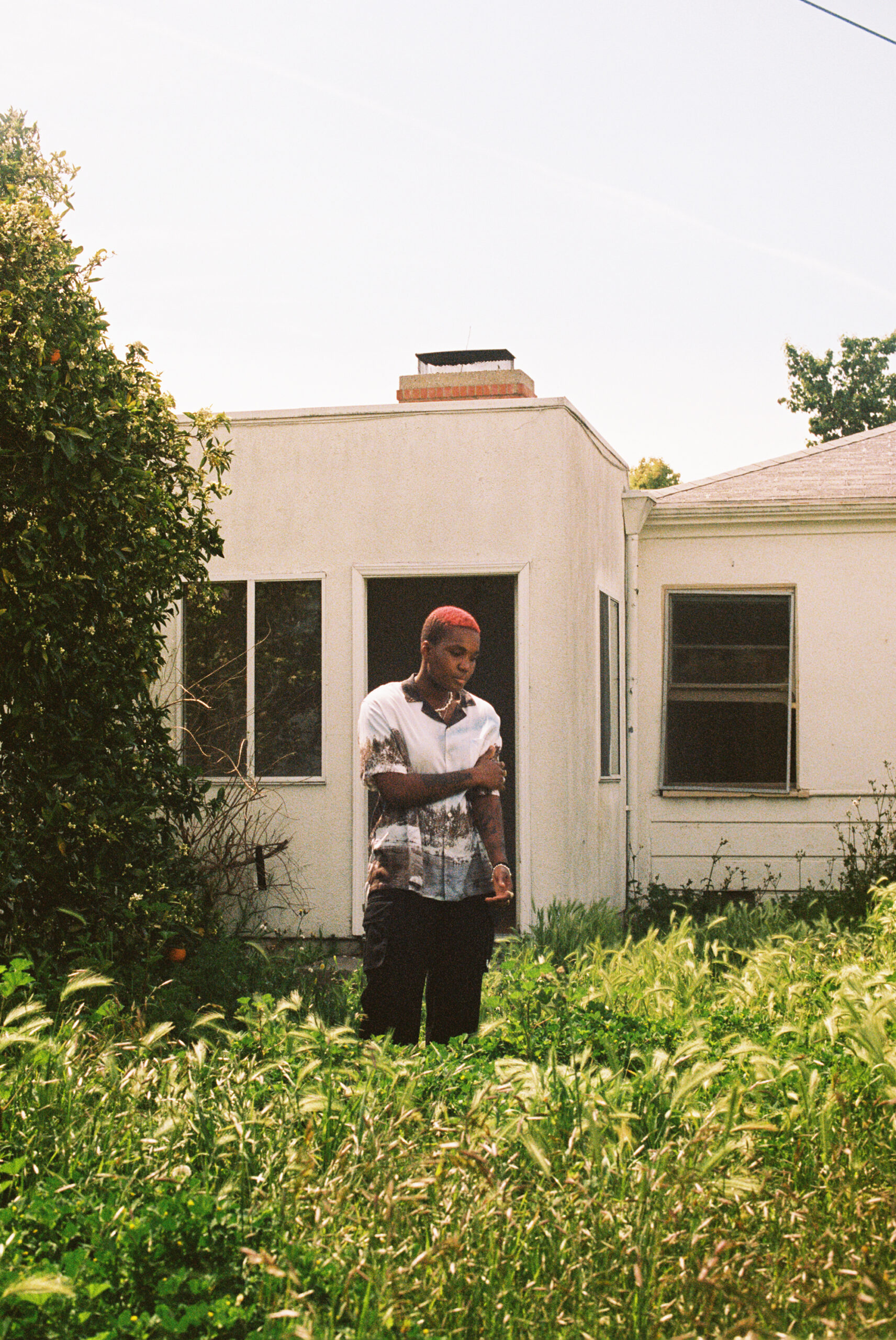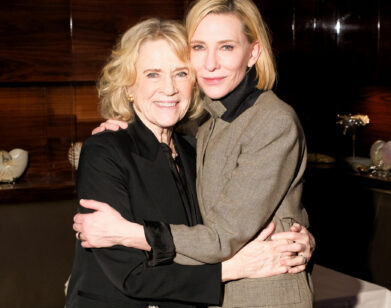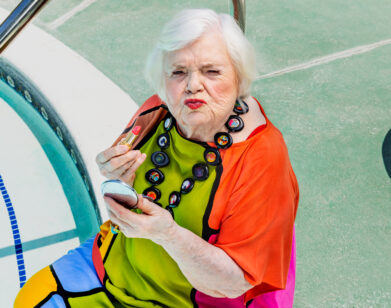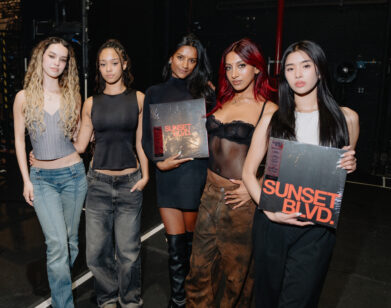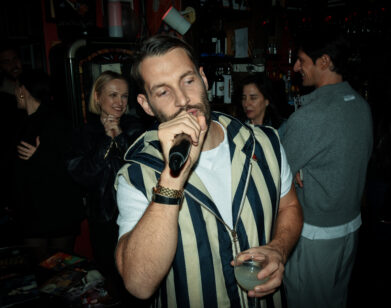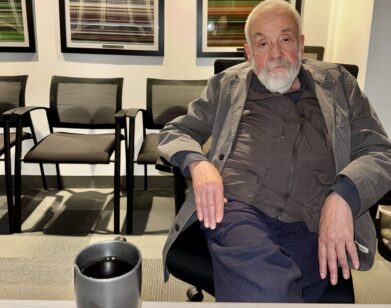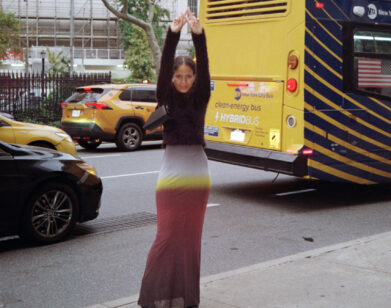POET
Arlo Parks Has Her Head in the Clouds
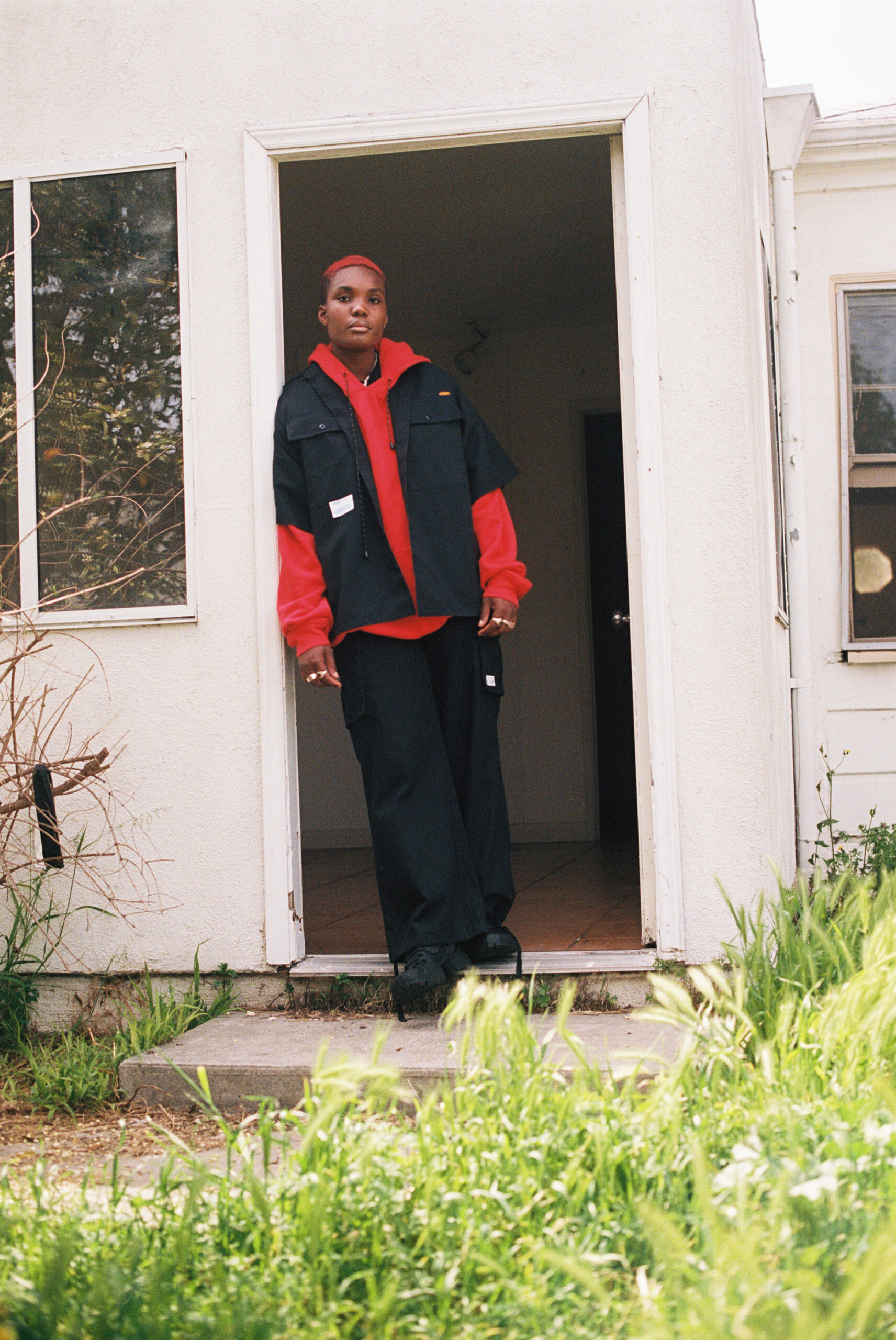
Arlo Parks wears Shirts and Pants Willy Chavarria. Hoodie Phipps. Jewelry (Worn Throughout) Arlo’s Own. Shoes Camper.
After a few missed connections, Arlo Parks gets on the line with Interview consigliere and playwright Jeremy O. Harris. The 22-year-old British singer-songwriter is preparing to release her sophomore album, and though her cerebral 2021 debut was a critical success, she’s still feeling nervy. Like most artists, Parks is protective over her poetic output, but after a conversation that covers everything from auto-fiction, to folk-music, to Phoebe Bridgers, it seems like she’s finally ready to let her fantasies flow freely.
———
TUESDAY 9PM MAY 9, 2023 LONDON
ARLO PARKS: Hello?
JEREMY O. HARRIS: Hi.
PARKS: Hey. How are you?
HARRIS: Good. I feel horrible because we seem to keep having the worst days around talking.
PARKS: I mean, you’ve caught me at the tail end of shooting two music videos today, so I’m sorry if I’m a little bit sleepy and slow.
HARRIS: It’s fine. Should we keep our cameras off for this?
PARKS: Yeah. It’s better. We’ve had years of Zoom, and I’m over it.
HARRIS: That makes me very happy. I’ve been in Zoom after Zoom after Zoom today while also trying to edit my film.
PARKS: Is it something that you’ve written and directed?
HARRIS: It’s a documentary. I’ve been filming it for three years and it’s finally done.
PARKS: Wow. Honestly, all the work that I’ve made is really condensed. I don’t think I’ve worked on anything for three years.
HARRIS: But you have such a truth and a brevity to your thoughts. I asked for all your lyrics–that’s how I listen to music, through reading. And the sensibility you have, the economy of language, is so alive. Do you think that comes from wanting to use fewer words? Or does it come from the fact that you’re letting it out of you as quickly as possible?
PARKS: It’s a mixture. I definitely write in these brief moments of lightning. But also when you think about a song, there is naturally a limit to the structure. When it comes to a chorus or a hook, you have to condense a whole sentiment into just one line. But in my poetry, I have more of an opportunity to flow, and muse, and be artistic with my sentiment.
HARRIS: What does that look like or sound like to you, when you write poetry compared to music?
PARKS: Poetry for me is more of a stream of consciousness. I edit myself a lot less when I’m writing poetry because I’ve never fully understood classical forms. With songwriting, I have to condense my language differently.
HARRIS: I like that sensibility. After I got cut from drama school, I decided that I wanted to be a poet, but I was really obsessed with form. I felt like following the rules became this constriction. I didn’t feel free inside of it. So it’s curious that poetry is where you feel the most free, because I’m from Virginia where so many people align with your sensibilities because they’re folk singers, and folk singers sing in run-on sentences.
PARKS: Definitely. For me, the beauty of poetry also lies in that tradition of folk music. It’s about including as much detail and specificity as I can, especially because a lot of my poetry comes from journals and following my thoughts in whatever spirals they go in. Maybe it’s because I never fully learned about the structures of sonnets or rhyme schemes. It’s almost like approaching music not having been to music school or having learned much theory at all. You just do it a bit more intuitively.
HARRIS: Well, you have one song that feels like a folk song of the modern era—it’s a song that I would get tattooed on me if I was the type of person to get tattoos. It’s called “Dog Rose.” Can you tell me a bit about that song? Because I can’t get the line, “Gowanus and mezcal,” out of my head. That feels like the worst night of your life, or the best.
PARKS: [Laughs] It was very much inspired by my first time coming to New York. I had a few friends there who made music and I had this barbecue on the roof of someone’s apartment in Gowanus. There was lots of mezcal. But this story actually comes from a dream that I had. It’s more about the possibility of what you might have with a person when you’re at the beginning of a crush. I imagined me and this person in this surreal version of that barbecue, us navigating the city together and building a life together before I’d even let them know that I liked them. That’s actually one of my favorite songs, I’m glad you gravitated towards it.
HARRIS: I’m friends with a lot of musicians and my favorite song on the album is always their favorite song. It’s my magic power. I mean, there’s so much fabulation on this album. You talk about the sense that you’re creating these sublime fantasies out of the mundane, do you feel like you’re often daydreaming?
PARKS: All the time. Maybe there’s a nugget of truth at the center of it, but it’s always me just embellishing details and trying to make something beautiful rather than something completely true, if that makes sense. I’m a daydreamy spacey person. I spend a lot of time with my head in the clouds, which I guess works for somebody who operates in a cerebral realm and who gets to wander around and look at things and write about them.
HARRIS: What’s your zodiac sign?
PARKS: I’m a double Leo, Sagittarius moon, so I’m triple fire.
HARRIS: Wow. I think the Sag of it all is why I was so attracted to you the first couple times I met you. Did you grow up with siblings?
PARKS: Yeah, I’ve got a little brother and he’s very much an intellectual, he studies philosophy at university and we’re quite close in age.
HARRIS: You just did that thing that some of my favorite songwriters do often, where they rhyme by accident, just casually. He studies philosophy at university. I’m like, “Oh god, when’s that going to end up in a song?”
PARKS: [Laughs] Honestly, everyone around me says that. They’ll be doing something and they’re like, “We know you’re going to write about this.” I’m like, “Well probably.”
HARRIS: One of the things I find so interesting about your album is that the number one featured artist of 2022, Phoebe Bridgers, found her way on there as well. Is Phoebe on everyone’s album because she’s aggressively DMing everyone, or is she just the most fun person to have in the studio?
PARKS: [Laughs] Honestly, she is so much fun and I feel like she’s both a shape-shifter and stays completely true to herself. You can put her in any world and she can melt into what has been created whilst still staying very strong in her voice and her style, which I really love.
HARRIS: Do you ever get nervous about how people are going to meet your albums or your songs? Or once it’s made, are you free?
PARKS: I’m never free from it. I obviously have an urge to share my music, otherwise it would be a completely private pursuit and what I make would never leave my computer. But it also opens up a world that was once very insular. It opens up the possibility of being misunderstood or misinterpreted or somebody not connecting to it at all. It’s nerve-wracking, especially when you put a lot of time into crafting something. But I’ve done it once before, so I feel like it’s a little bit less terrifying than it was.
HARRIS: I do something similar to what you do, where I’m fully writing for myself and pulling from things that feel auto-fictional while also completely distorting and manipulating them. Once it’s out of me, I’m breathing a breath of fresh air, but it does often feel quite destabilizing to have people treat this thing, that I think of as an extension of me, as property that they own. So now I’m in this place where I feel quite protective of things that I release out into the world.
PARKS: That makes sense. Especially when it’s something that you’ve put a lot of yourself into and suddenly it’s not yours in the way it once was.
HARRIS: Exactly.
PARKS: Oh god, I’m just thinking about it now, because it’s coming out in two weeks. So all of these feelings are very real.
HARRIS: Well, we’re constantly making, releasing, making, releasing. So it makes that sense of preciousness have a smaller half-life. When do you see yourself working on your next thing? Or have you already started?
PARKS: I already started, let’s be honest. [Laughs]
HARRIS: I knew it.
PARKS: Yeah. I started before My Soft Machine [Parks’s debut album] was finished. I was already planting little seeds and rooting around inside myself, getting in with my producers.
HARRIS: That’s beautiful. What kind of artist do you see yourself being in 30 years? Do you want to be making music? Or do you want to be writing poetry in some cabin in Manchester?
PARKS: Definitely not in Manchester. [Laughs] I think I’ll be living a more solitary existence, but I don’t think I’ll ever be completely tucked away. I do imagine myself being in novel mode for maybe half of the year, in a little cabin in the Catskills, having my little hermit moment. But I think that I’ll still be making music. I’ll have branched into a lot of different things, though. Maybe it’s poetry, maybe it’s screenwriting, maybe it’s scoring. I want to learn how to do woodwork. I don’t know why, I always gravitated towards making something with my hands.
HARRIS: Is there going to be an Arlo Parks furniture line?
PARKS: Maybe. Who knows? I’m being fully serious. I may one day have a little woodworking workshop and make strange stools and tables. So stay tuned for that in 30 years.
HARRIS: I’m tuned in and turning up the volume. Okay. My last question for you, because I think the kids need to know this. Do you write every day? And if so, what is your process?
PARKS: I do write every day. Sometimes it’s just one line, or I can be going at it for hours. I wasn’t always this way, but I try to have it as a practice. I don’t put any limits or expectations on it in terms of quantity or quality. Just getting into the habit of writing something every day—that’s my anchor. Usually I’ll do it at the end of the day and yeah, it feels good.
HARRIS: I aspire to be one of those people who wakes up every day at 6 a.m. and does four straight hours of morning pages, then goes to the gym, gets tight for their husband, then comes home, writes more, and then has dinner waiting. That would be my ideal writer’s life. But unfortunately, I am someone who writes more often when the muse hits them, which is not a consistent way to write. I don’t like feeling dependent on an elusory spirit, so I’m trying to write more often. Right now I’m at a stage where I’ll always write at least one or two sentences in my notes app. Maybe that’s enough.
PARKS: That is enough. For so long I was just chained to the muse that when it didn’t visit, I felt completely broken and desperate for it. If I write something every day, it’s me trying to convince myself that I’m no longer chained, even though I still am.
HARRIS: Which song on your album do you think the muse is the heaviest in?
PARKS: Maybe “Devotion,” the heaviest song on there, just because it felt so out of the blue, but everything really aligned. I felt like I explored the feeling skillfully, but there was also this real sense of chaos and rawness to it, and I made it with people that I love. It came very quickly and fully formed and it had an ease to it. It wasn’t one of those painful chiseling over months and months that ends with more relief than anything else. It just felt good.
HARRIS: Oh, that’s beautiful.
PARKS: I love our little chat.
HARRIS: Me too. And I can’t wait to
see your face again.
PARKS: Yes. Enjoy the rest of your
night, or day.
HARRIS: Thank you.
PARKS: Bye. Bye.
———
Hair: Carisa Arellano using Bleach London
Makeup: Zaheer Sukhnandan using MAC Cosmetics
Nails: Christina Guerra using CND
Photo Assistant: Tasnim Boufelfel
Styling Assistant: Cara Catabay

